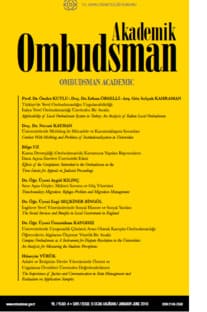YÜKSEKÖĞRETİM VE İNSAN HAKLARI: BİTMEYEN BİR TARTIŞMA
Eğitim hakkı hem ulusal hem de uluslararası düzeyde son yıllarda ana
günden konularından birisi olmayı başardı.
Uluslararası insan hakları belgeleri, eğitimi temel bir insan hakkı
olarak tanımlarken, verilecek eğitimin de insan hakları ilke ve prensiplerine
uygun olması gerektiğini belirtmektedirler. Fakat yükseköğretimin evrensel bir
insan hakkı olup olmadığı konusunda literatürde derin görüş ayrılıkları var.
Kimisi yükseköğretimi bir insan hakkı olarak tanımlarken, başkası bunun
tartışmalı olduğunu ileri sürebilmektedir. Söz konusu tartışma sadece eğitim
hakkın tanımı ile sınırlı olmayıp doğası, kapsamı ve niteliğiyle de
ilgilidir. Bu çalışma yükseköğretim ve
insan hakları bağlamında birkaç temel soruya cevap aramaya çalışmaktadır:
Yükseköğretim evrensel bir insan hakkı mıdır? Hak-temelli bir yükseköğretim
nasıl olmalıdır? Üniversitede akademik özgürlük ve kurumsal özerklik bu
tartışmanın neresinde yer almaktadır? Bu çalışmanın ulaştığı veriler dikkate
alındığında, akademik özgürlüğün üniversitelerde önemsendiği fakat yeterince
tartışılmadığı, çalışılmadığı ve öncelenmediği açıkça görülecektir. Bu kısa
çalışma, söz konusu sorunların aşılması için bir takım öneriler sunmaktadır.
Anahtar Kelimeler:
Eğitim Hakkı, Yükseköğretim, İnsan Hakları, Akademik Özgürlük, Katılımcılık
___
- AKYEŞİLMEN, Nezir (2014). "Uluslararası İnsan hakları Düzenlemeleri ve Eğitim: Eğitime Hak temelli Bir bakış", Milli Eğitim, Yıl: 43, Sayı: 201, ss. 5-16. ALGAN, Bülent (2004). "Rethinking 'Third generation' Human Rights", Ankara Law r Review, Vol.1, No.1, ss. 121-155. ALTBACH, Philip, G. (2001). "Academic freedom: International Realities and Challenges", Higher Education, Kluwer Academic Publishers, ss.205-219. http://link.springer.com/article/10.1023/A:1026791518365#page-1 (09.04.2015). BENDEK, Wolfgang (2012). Understanding Human Rights, Neuer Wissenschaftlicher Verlag, Graz. CHRİSP, Jillian (2013). Human Rights Education A Manual for National Human Rights Institutions, Asia Pacific Forum of National Human Rights Institutions, Sydney. CONESCU, Adrian Vasillas, (2009). "The Generations of Human's Rights", Dny Prava, Days of Law: the Conference Proceedings, 1. edition, Masaryk University, Brno. http://www.law.muni.cz/sborniky/dny_prava_2009/files/prispevky/tvorba_prava/Cornescu_Adrian_Vasile.pdf ( 12.04.2015). DONELLY, Jack (1986), "International Human Rights: A Regime Analysis", International Organization, 40 (3), ss. 599-639. DOWNS, Donald, A (2009). Academic Freedom: What It Is, What It Isn’t, and How to Tell the Difference, John W. Pope Center for Higher Education Policy, Raleigh. http://www.popecenter.org/acrobat/AcademicFreedom.pdf (12.04.2015). GLOBALHİGHERED (2011). "Tertiary Education: A Global Report", https://globalhighered.wordpress.com/2011/11/26/tertiary-education-a-global-report/ (26.03.2015). HAULE, Romuald, R. (2006). "Some Reflections on the Foundation of Human Rights : Are Human Rights an Alternative to Moral Values?", Max Planck Yearbook of United Nations Law, Vol.10, ss.367-395. ILO-UNESCO (2012).Joint ILO–UNESCO Committee of Experts on the Application of the Recommendations concerning Teaching Personnel (CEART), UNESCO-ILO, Geneva, http://www.right-to-education.org/sites/right-to-education.org/files/resource-attachments/ILO%20%26%20UNESCO_The_status_of_academic_freedom_and_institutional_autonomy_worldwide_2012_en.pdf( 02.04.2015). JENNIFER-Morgan, Swift. (2006), “What Community Participation in Schooling Means: Insights from Southern Ethiopia”,Harvard Educational Review, Cil.76, No.3, ss.339-368. KARA, Uğur (2014). Temel İnsan Hakları Bilgisi-I, ( 5. baskı),Anadolu Üniversitesi Yayını, Eskişehir. KARRAN, Terence (2007). "Academic Freedom in Europe: A Preliminary Comparative Analysis", Higher Education Policy, 20, ss. 289-313. MADİGAN, Janet Holl (2004). Being Human, Beeing good: The Source and Summit Universal Human Rights, Dissertation Submitted to the University of Maryland, http://drum.lib.umd.edu/bitstream/1903/1753/1/umi-umd-1729.pdf ( 12.04.2015). MAGNA-CHARTA (1999), "The Bologna Declaration of 19 June 1999", http://www.magna-charta.org/resources/files/BOLOGNA_DECLARATION.pdf (02.04.2015). MCCOWAN, Tristan (2012). "Is there a universal right to education", Bitish Journal of Educational Studies, 60 (2), ss.111-128. OSCE, Council of Europe, UNHCHR and UNESCO (2008). Human Rights Education in the School Systems of Europe, Central Asia and North America: A Compendium of Good Practice, Poligrafus Andrzej Adamiak, Warsaw. OSLER, Audrey H. (2012). "Higher education, human rights and inclusive citizenship", Tehmina Basit ve Sally Tomlinson,Social Inclusion and Higher Education, The Policy Press, Bristol. PAVEL, Nicolae (2012). "Classification of Fundamental Rights and Freedoms- a diachronic Approach and Current Trends", Challenges of the Knowledge Society ( conf. paper), Jourlib Journal, http://www.jourlib.org/paper/2954050#.VSrcUvmsXT8 (12.04.2015). POCH, Robert K. (1993). Academic Freedom in American Higher Education: Rights, Responsibilities and Limitations, Ashe-Eric Higher Education Reports- Rep. No.4, The George Washington University, Washington D.C. SASTRY, T.S.N. (2011). Introduction to Human Rights and Dutries, University of Pune, Pune. SEGGİE, Fatma Nevra ve Gökbel, Veysel (2014). Geçmişten Günümüze Akademik Özgürlük, SETA, Ankara. UNESCO (1997)." Recommendation concerning the Status of Higher-Education Teaching Personnel ", http://www.unesco.org/education/docs/recom_e.html (02.04.2015). UNICEF (2007). A Human Rights Based Approach to Education for All, UNICEF, New York.
- ISSN: 2148-256X
- Yayın Aralığı: 2
- Başlangıç: 2014
- Yayıncı: Kamu Denetçiliği Kurumu
